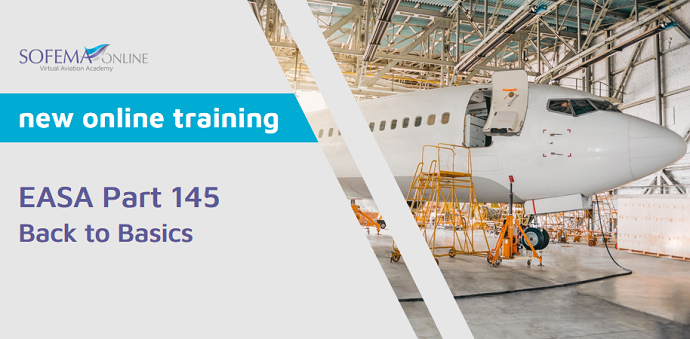Special offer to EASA Part 145 Quality & Safety Managers, Training Managers, and Post Holders:
If you are considering Sofema Online EASA Part 145 Back to Basics as part of your recurrent training program – please contact team@sassofia.com for an FOC enrolment to evaluate the effectiveness of the training – we are confident you will not be disappointed.
What is Back to Basics?
Quite simply it is an in-depth review of the EASA Part 145 Regulatory Requirements fully focused on the needs and obligations of EASA Part 145 Certifying Staff.
This program works ideally as a recurrent training where it is either necessary or worthwhile to remind certifying staff regarding the importance of the essential role they perform within the organisation.
Course Details
The aims of the course are to revisit the fundamental roles responsibilities and obligations to give delegates a recurrent perspective on the importance of fully engaging with EASA Part 145 regulation.
The training includes many practical examples of Part 145 Implementation and how to avoid potential problems together with detailed discussions regarding the challenges which are faced in the 145 workplace and how to address them in a practical way.
The training will also promote the delegates’ understanding concerning both airworthiness and maintenance principles, including a thorough understanding of the Role of Part 145 in all jurisdictions managed by an EASA Regulatory environment as applicable.
In particular, the delegate will consider their individual responsibilities to ensure the positive development of the employee’s business area. See more
Who is the Course for?
Operators and Maintenance Organisations Personnel, Quality Assurance Staff, Production Planing Staff, and MRO (Maintenance, Repair, and Overhaul) approval holders.
What is the Benefit of this Training – What will I learn?
a) Ensuring a comprehensive understanding of your roles and responsibilities within the organisation. Both related to regulatory drivers and due diligence.
b) The ability to fully apply the regulation in the best way to ensure full involvement of the delegate in the business area.
c) Understand how your personal responsibilities impact the organisation.
d) Competent employees work more efficiently – knowing and understanding builds Competence.
e) A raised level of understanding supports the efficient implementation of Part 145 Process and Procedures.
Content of the Training Course:
Abbreviations & Definitions – Considering Key Terminology relevant to our Specific Areas of Responsibilities
Regulatory Framework – How it Fits Together
Continuous Airworthiness. The Role of Part 145 B1& B2 Certifier
Understanding and Managing Competencies in a Part 145 Environment (How do we Define Competence?)
What are Aviation Standards. How do they Impact our Job Roles
MSG3 Inspection Standards. Consider the difference between VI, GVI & DVI
145.A.25 Facility Requirements what is Involved in Managing the Facility. What are the Challenges?
145.A.30 Personnel requirements Roles Responsibilities – Obligations and Engagement with the Organisation
145.A.35 Certifying Staff and Category B1 and B2 Support Staff. Review of Roles Responsibilities and the QC Personal Obligations.
145.A.40 Equipment, Tools and Material. How to Manage and Control – Challenges and Issues
145.A.42 Acceptance of Components. What are the Responsibilities of the Supplies Department & What are the responsibilities of the Certifying Staff. Configuration Control & STC Issuers
145.A.45 Maintenance Data. How to Manage & Control Data. What are the User Responsibilities, Internal Reporting Obligations.
145.A.47 Production Planning Consider Roles Responsibilities and Challenges. Communication Support & Efficient Planning Processes
145.A.48 Performance of Maintenance. Consider the Development of Critical Task Inspections & How to Manage
145.A.50 Certification of Maintenance. Considering Group and Personal Obligations
145.A.55 Maintenance Records. What Constitutes Part 145 records Considering Mandatory & Organisational Retention. Obligations
145.A.60 Occurrence Reporting consider the role of Occurrence Reporting External and Internal. Iceberg of Ignorance
145.A.65 Safety and Quality Policy, Maintenance Procedures, and Quality System. Detailed Review of the Role and Responsibility of Independent Quality Assurance QA / and the Personal QC Obligations of the Employee
Managing Aviation Maintenance Error
Tags:
aviation, Aviation Maintenance, EASA Part 145, Online Training, Part 145 Recurrent Training, EASA Regulatory, SOL Training, Part 145 Certifying staff, Part 145 Back to Basics





